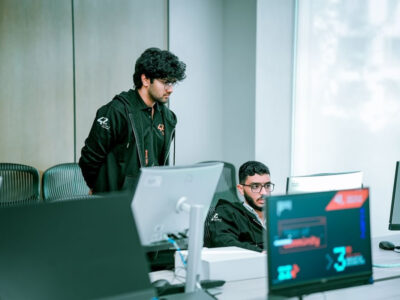In the gritty streets of Deira, the old commercial heart of
Dubai, lurks a threat to some of the region’s biggest telecommunications firms.
It is here on the northern bank of Dubai creek, among the
grocery stores and barbers, the discount tailors and food stalls, where
low-wage workers come after a day’s toil to phone their family and friends
overseas.
Instead of using their pre-paid mobile phones, they cram
into the sweaty booths of dilapidated backstreet internet shops to call home at
prices a fraction of those charged by telecom operators Etisalat, the United
Arab Emirates’ most valuable listed company, and rival du.
These shops dodge government inspectors to offer unlicenced
Voice over Internet Protocol (VoIP) services – free Internet-to-Internet calls
and cheap Internet-to-phone calls. The UAE’s regulator says only licenced
companies can provide VoIP.
“It’s less than a tenth of the cost of Etisalat, that’s
why I come here,” said Mansour, 21. The Afghan works in a Deira clothes
shop and calls his family in Kabul three times a week from a 14-booth VoIP shop
run by managers Mamun and Shajib, both 22.
The Bangladeshi pair have been offering VoIP services for
more than a year and spoke on condition that their full names and company
details were not disclosed.
“For internet we can only charge AED3 ($0.82) an hour
and that’s not enough to pay two salaries, shop rent, licences and broadband
costs,” said Shajib. “We would have shut if it wasn’t for VoIP, but
this is very popular and more and more people are telling their friends.
“Most people’s salaries are not even AED1,400 per month
and they can’t spend much on the telephone, so that’s why they come here. If
Etisalat or du offered the same rates as us, we would close down
tomorrow.”
Internet-to-phone calls via Skype, the global leader for
consumer VoIP, are intermittently blocked in the UAE, but the Deira shops also use
other programmes such as Calls Telecom and Call World for internet-to-phone
calls, and these seem to work without hindrance.
Rates start at AED0.1 per minute to phone a landline in
India, with Pakistan, Bangladesh and Sri Lanka the other top destinations, Shajib
said. Prices to these countries are about AED0.25 per minute on average.
To call India, Etisalat and du charge AED1.89 per minute for
off-peak calls between 9 pm and 7am and AED2.40 at other times.
The regulator sets their tariffs, so the two operators
cannot directly compete on price and instead tout various call packages.
Etisalat offers subscribers a 60 percent discount on late-night calls to the
subcontinent, but its fees are still much higher than the rates offered by
Shajib and rival shops.
Etisalat operates across 18 countries but three-quarters of
its revenue comes from the UAE, while du is a single-country carrier, and
international calls are among their biggest income streams. So VoIP is
potentially disastrous for them.
Article continues on
next page…
“It’s a losing battle – when you try to ban or restrict
something on the Internet, the harder you squeeze, the more it gets between
your fingers,” said Oliver Johnson, chief executive of British-based telecoms
research firm Point Topic.
“As speeds increase, people will value VoIP more and
more and they won’t see why they should make a normal international call
instead. Margins on international calls are yesterday’s revenues.”
Four-fifths of UAE residents are expatriates, which spurs
demand for international calls. Wealthier Western and Arab residents have
better access to the internet, at home and at work, and were the first to use
VoIP services in the UAE; its spread to the lower-income majority could be a
game changer for Etisalat and du.
“If VoIP was legal and widely available, it would be a
disaster for Gulf operators,” said Pedro Oliveira, partner at consultants
Oliver Wyman.
Many smart phones come ready-installed with Skype, which can
be used for internet-to-internet calls. Operators are pushing these high-end
handsets as they try to offset falling profit margins on voice calls by selling
data packages, so they are aiding the rise of a technology that could hurt
their own businesses. Etisalat’s profits have fallen in six of the past seven
quarters.
“There are really three big competitors [in the UAE]
and one of those is VoIP…you can see it on the street corner,” said
Matthew Willsher, Etisalat’s chief marketing officer.
So far, the UAE telecommunications regulator seems
determined to resist the rise of Internet-based phone calls as it tries to
protect revenues in the government-controlled sector. Only Etisalat and du are
licenced to provide VoIP services, and they have yet to do so. The two
companies are majority-owned by government-linked institutions and the sector
is an important source of state revenue.
“So long as regulators remain part of the government
and the government continues to own controlling stakes, then protectionism will
remain high,” said Oliver Wyman’s Oliveira.
In October, Etisalat unveiled plans for ePlus, an online
platform it says will include social and instant messaging, plus VoIP calling.
But it has not revealed likely prices for VoIP calls and the UAE regulator,
which must approve these tariffs, has dampened expectations for any major
savings for consumers.
Article continues on
next page…
“Do not expect prices to fall drastically just because
voice over IP services are launched,” Majed Almesmar, deputy
director-general of the Telecommunications Regulatory Authority, told reporters
at an exhibition in Dubai. “We are waiting for them [the operators] to
come with certain packages or proposals. We need to look at those
proposals.”
As Mansour in Deira explained, low-cost calls are the main
motivation for people using VoIP, so rolling out VoIP services that do not
offer steep discounts to conventional services would be unlikely to satisfy
consumers.
Du has also said it will launch VoIP services, but it is
unclear when this will happen; other UAE innovations such as number portability
were delayed for over three years and a deal to allow open competition on fixed
line services is running late.
Ultimately, fighting VoIP could harm the UAE’s economic
competitiveness, some analysts argue.
“Protectionism could harm economic development if it
places other industries at a disadvantage to those based elsewhere- eventually,
governments could decide these negatives outweigh the positives and loosen VoIP
restrictions,” said Oliveira.





